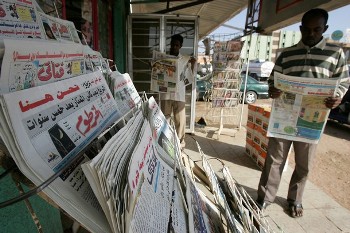Sudan sends controversial press law to national assembly
April 20, 2009 (KHARTOUM) — The Sudanese government has sent a draft press law to parliament which is likely to stir intense debate as may journalist view it as a serious setback to press freedoms in the country.

The draft was one of many laws that the ruling National Congress Party (NCP) and Sudan People Liberation Movement (SPLM) were deadlocked on. The changes were meant to make laws conform to the constitution and the Comprehensive Peace Agreement (CPA) between the North and South in 2005.
The draft law gives wide powers to the Sudanese president with regard to press including appointment of a third of press council members, approving the council’s budget and setting the state policy on journalism.
Furthermore the proposed law imposes hefty monetary fines on violations by the newspapers which some journalist say would effectively mean that penalized institutions will be unable to continue operating.
Sudanese authorities have stepped up censorship of the press since the coup attempt against Chadian President Idris Deby backed by Khartoum. The Sudanese spy chief Salah Gosh at the time accused some journalist of receiving money from Western embassies but declined to give names.
Security services are dispatched at night to review newspapers before they are published and have the power to remove any articles and in some cases ban entire edition for days.
The newspapers are particularly screened to censor any articles appearing to be sympathetic with the International Criminal Court (ICC) which last month issued an arrest warrant for president Omer Hassan Al-Bashir.
Last November Sudanese authorities arrested over 70 journalists who demonstrated outside the national assembly to protest against press censorship.
The head of SPLM bloc in the national assembly Yasir Arman said that they are open to discussions with other parties and journalists to make changes to the draft law.
But an NCP official at the national assembly Mohamed Al-Hassan Al-Amin dismissed SPLM claims that they were not involved in writing up the draft and stressed that it was adjusted to incorporate the southern ex-rebels demands.
He also maintained that further amendments can be made should the SPLM ask for it. However critics say that the ruling NCP is capable of adopting laws using its majority in the national assembly even without the consent of other parties.
(ST)

Moses Kur Akech
Sudan sends controversial press law to national assembly
“It’s not just the right of the person who speaks to be heard, it is the right of everyone in the audience to listen and to hear, and every time you silence somebody you make yourself a prisoner of your own action because you deny yourself the right to hear something. Your own right to hear and be exposed is as much involved in all these cases as is the right of the other to voice his or her view.” Christopher Hitchens, Orwell’s Victory, a speech at University of Toronto, 15th Nov 2006
US first constitutional amendment on freedom of expression stipulates that, the freedom of mind which suits the members of the self-governing community is not a given and glued part of human nature. However, it can be amplified and instituted by learning, teaching and by unrestricted flow of information.
In contrast, I am not comparing USA and Khartoum regime in anyway on democratic ground. Briefly, USA is ruled by civil self-governance through free expression of citizens’ views. This is one of the fundamental democratic ideals of every sef-governing society or civilians governing themselves thru free expression. However, Khartoum which has been, and still under blood tainted dictorship is on the reverse gear instead of the timely-needed drive gear which can lead the country onto the track of democratic transition.
Decisions that are made in the parliament can never be compatible with interest of ordinary citizens who are barred or restricted from freely feeding parliamentary servants with information that can help them in making informed decisions.
Sudan will still be on the five decades old track of instability until free and unintimidatory political atmosphere is established for citizens to freely voice out their likes and unlikes.I reckon what will happen if things fail to change rapidly is that, the country will split into pieces,(South, North, West and East). This is the most likely option left to voiceless or marginalised citizens. The Sudanese opposition Parties who cannot freely excercise their duties without threat to their lives from military regime will choose what they can do next since political goodwill is nomore.
Dinka Aliap Chawul
Sudan sends controversial press law to national assembly
Mr Bashir is a man well known for his objections to any reports which exposes him openly to sudanese citizens,international community and the ICC and therefore the parliement should block him tightening his grift on the press.
Kur
Sudan sends controversial press law to national assembly
What I fail to understand is why these power hungry dogs fear the freedom of speech? Do n’t they know that their days are numbered? People will demand freedom regardless of who tries to deny them that natural right.
I wonder whether there is someone somewhere in the Sudan who will try to educate these primitive jungle rulers that freedom does not hurt anybody, but enhances public education concerning the political, social, economic development, and peace in the country. It is nave and even evil to try to protect yourself from the same people that you seek to rule. It will not simply work. Therefore, censorship of the press must stop, and those stupid laws must be removed entirely.
Kur